May 15, 2025 | 05:17 GMT +7
May 15, 2025 | 05:17 GMT +7
Hotline: 0913.378.918
May 15, 2025 | 05:17 GMT +7
Hotline: 0913.378.918

Prime Minister Pham Minh Chinh speaks at the opening plenary session of the WEF Dalian 2024 Conference. Photo: VGP.
On the morning of June 25th, Prime Minister Pham Minh Chinh attended and delivered a special speech at the opening plenary session of the WEF Dalian 2024 Conference.
Expressing gratitude to Chinese Premier Li Qiang and Professor Klaus Schwab for inviting him and the high-level Vietnamese delegation to this important forum, Prime Minister Pham Minh Chinh emphasized: "’Next Frontiers for Growth’ and the six themes of this year’s conference reflects the strategic, responsible vision of the WEF and the important role of China on the future development of the world.”
According to the leader of Vietnam’s Government, the future of the globe hinges on three primary factors and is shaped and propelled by three key areas.
In particular, the three impactful factors include: The rapid advancement of science and technology, innovation, particularly in digitalization and artificial intelligence; The profound impacts of climate change, natural disasters, resource depletion and aging population; The growing fragmentation and polarization fuelled by conflicts, wars and global-scale geostrategic, geopolitical and geoeconomic competitions.
The three trailblazing areas include: Development of digital economy; Development of green economy and circular economy; Development of high-quality human resources and AI and the fourth industrial revolution.
The evolution of these transformative areas will usher in the "next frontiers for growth" with profound and far-reaching impacts on every person and sector all over the world.
“This calls for the adoption of a new mindset and approach, which should be people-centered, comprehensive and result-oriented with a global perspective, delivering overall benefits to all, both in the immediate and long term”, Prime Minister Pham Minh Chinh stated.
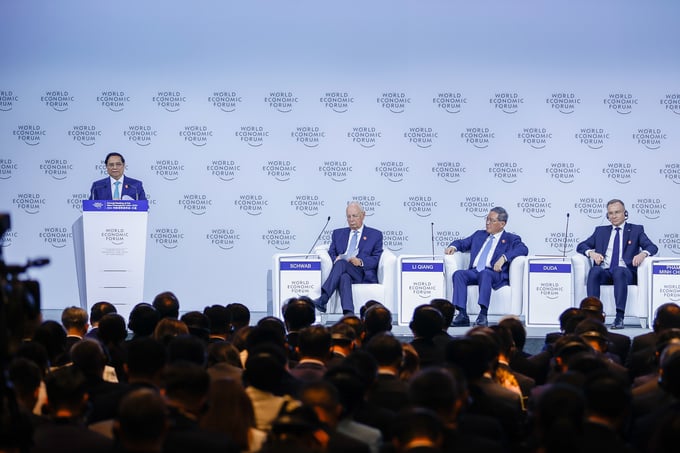
Prime Minister Pham Minh Chinh shared insightful observations on five prominent characteristics of the global economy. Photo: VGP.
According to Prime Minister Pham Minh Chinh, as close neighbours bound by shared mountains and rivers, Vietnam and China are currently working together to build a "Community with a Shared Future." Vietnam is pleased to witness China's strong development and rise amidst difficult and challenging regional and world situation.
China has become the world's second-largest economy, achieving the fastest growth rate globally over the past four decades with significant contributions to global economic growth.
“We are confident that China will continue to play a crucial role in the global economy, particularly in advancing digital, green transformations, circular economy and bolstering international economic integration and cooperation. A strong, self-reliant Chinese economy will have positive impacts on the world as it deepens its global integration”, the Prime Minister’s statement noted.
Vietnam’s Governmental leader also shared encouragement over China's continued commitment to working with the international community to vigorously champion multilateralism, bolster international solidarity and cooperation, and safeguard a peaceful, stable, and cooperative environment for prosperous development in the region and the entire world.
For the part of Vietnam, the Prime Minister affirmed: “Vietnam’s success over the past nearly four decades is attributed to the key terms: Reform, Innovation and Integration. These endeavours have yielded profound and historic achievements”.
Vietnam has undergone a remarkable transformation, emerging from a position of a 30 year war-torn, embargoed country to a dynamic middle-income nation. Today, the country proudly stand among the world's top 40 economies and rank as one of the top 20 trade and investment partners globally. With 16 free trade agreements (FTAs), and diplomatic relations with 193 countries.
In 2023, Viet Nam's economy surged to $430 billion in 2023, with GDP per capita reaching $4,300 and foreign investments registering a record $36.6 billion.
According to the Prime Minister, these achievements underscore the effectiveness of Viet Nam’s development strategies and policies under the leadership of the Communist Party and the State, which are grounded in three key pillars: Building a socialist-oriented democracy; Building a socialist rule of law state; Developing a socialist-oriented market economy. “Throughout this process, the unwavering principle is to maintain political stability, with people at the center—as both subjects and the ultimate goal—serving as the driving force and the most valuable resource for development, ensuring that social progress, social security, justice, and environmental sustainability are prioritized alongside economic growth.”
Prime Minister Pham Minh Chinh also stressed that Vietnam has been playing a key role in actively contributing to an ASEAN Community, which is strong, united, cooperative with unity in diversity. Vietnam, alongside ASEAN, will deepen collaboration with China, the World Economic Forum, and other partners to champion new drivers of growth. Simultaneously, we will make every effort to maintain and strengthen an environment of peace, stability, cooperation and development in the region and the world.
After the opening session, the Prime Minister attended and spoke at the discussion session with leaders (IGWEL) on "Cooperation Towards Economic Growth." The discussion was attended by Professor Klaus Schwab, Founder and Executive Chairman of the WEF, UN Deputy Secretary-General Amina Mohammed, ministers, senior leaders of corporations, and global pioneers who are members of the WEF.
To foster economic growth, the Prime Minister emphasized five priority solutions, including: (1) building and innovating the global economic governance system towards efficiency, transparency, and inclusiveness; (2) establishing a framework for macroeconomic policy coordination; (3) promoting trade and investment liberalization; (4) enhancing cooperation in mobilizing resources for development; (5) focusing on strongly promoting new growth drivers.
To reach "Next frontiers for growth " and new development horizons, Vietnam suggests that the WEF, partners, and the business community further strengthen their support and sharing.
Specifically, this includes areas such as building and perfecting a market economy institutional framework, effectively mobilizing and utilizing all resources, and improving national governance efficiency.
Secondly, helping and supporting resources, focusing on the development of strategic infrastructure systems (transport infrastructure, digital infrastructure, climate change response, social infrastructure, healthcare, and education).
Thirdly, transferring advanced technology and prioritizing training and developing human resources, especially high-quality human resources.
Particularly, Vietnam proposes enhancing international cooperation in policy-making, planning, and implementation on regional and global scales.
Translated by Linh Linh
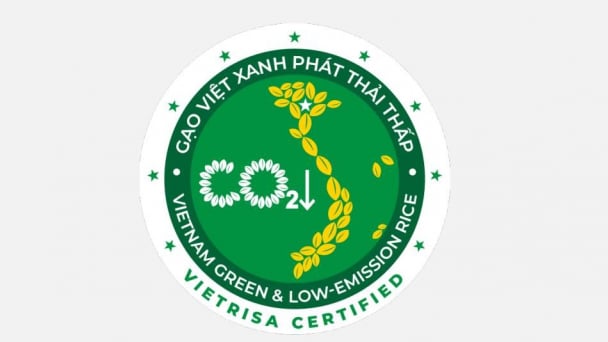
(VAN) The launch of the Vietnam green and low-emission rice brand is a positive signal for both businesses and farmers, marking readiness to reach new heights in the global market.

(VAN) The U.S. tariff will have a significant impact on Vietnam’s wood industry as well as the U.S. furniture market. A reasonable tariff rate would be beneficial for both sides.
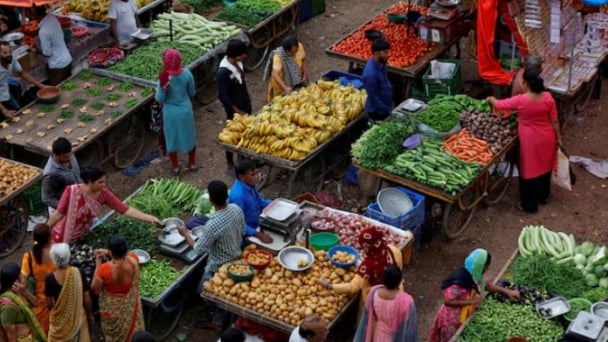
(VAN) India's retail inflation remained below the central bank's 4% target for the third consecutive month as food prices rose at a slower pace, opening up room for more interest rate cuts.
![Multi-channel, multi-directional Vietnamese agricultural markets: [5] Safety is the key](https://t.ex-cdn.com/nongnghiepmoitruong.vn/608w/files/linhnhp/2025/05/13/trai-cay-viet-nam-170345_133-221148-0908330.jpg)
(VAN) The Middle Eastern market presents new opportunities for Vietnamese agricultural products, but safety in product quality, payment, and partnership relations is a fundamental principle.
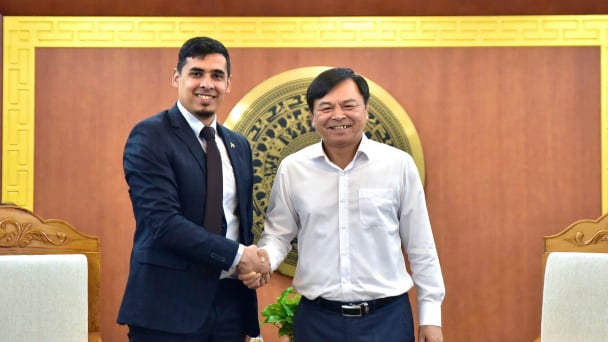
(VAN) Vietnam's participation in the AGROALBA project helps open up broader investment opportunities for enterprises to access markets in the fields of agriculture.
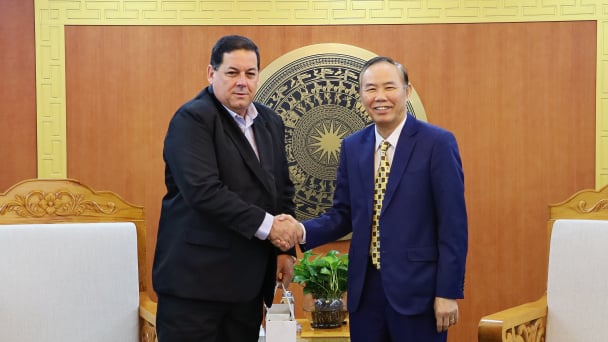
(VAN) On May 13, Deputy Minister of Agriculture and Environment Phung Duc Tien held a meeting with Cuban Deputy Minister of the Food Industry Javier Francisco Agular Rodriguez.
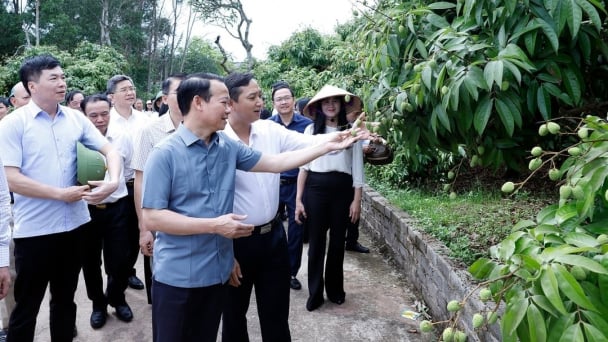
(VAN) Agriculture and environment sector experienced a 3.74% increase in growth during the first four months of 2025, with exports surpassing 21 billion USD. This growth was sustained by effective reforms and a trade surplus.